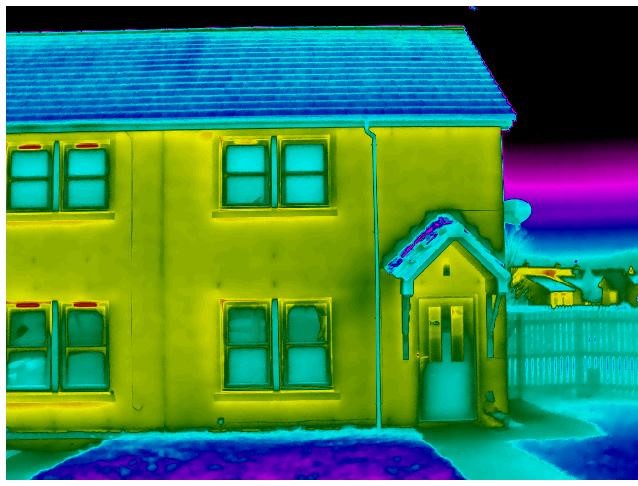
A Dundee-based thermal imaging company is developing AI to reduce heat loss in homes thanks to funding from The Data Lab, Scotland’s innovation centre for data and AI.
IRT, which identifies how developers and associations can make their property portfolio more energy efficient through thermal imaging data capture and analysis, will work with academics at Robert Gordon University to develop AI-based software to automatically remove redundant objects including trees and cars from its thermal image scans, saving ‘significant’ time in manual cropping.
The organisation, which already has a framework to process and analyse thermal images to estimate the heat loss in homes captures between 300-500 properties per day, but currently relies on staff to manually prepare images for analysis. This involves removing unwanted elements such as windows and doors, or neighbouring houses and cars.
Given the automated process of other elements of this framework, IRT turned to The Data Lab and Robert Gordon University to gain access to funding and skills to develop an AI solution. This has been tipped to allow the IRT team to accelerate their capability in the decarbonisation of the built environment.
Once the system is live, it is expected to speed up the pre-processing of images by 10x, allowing the IRT team to focus more time on analysing the processed data. As a result, customers will be able to understand the energy performance of their portfolio faster.
The solution will also allow IRT to develop a more detailed retrofit assessment for properties.
Stewart Little, CEO at IRT, said, “Image cropping has become a very labour-intensive task for us resulting in bottlenecks for our relatively small team. This has had a direct correlation on productivity as we can lose weeks of time as we crop hundreds of images a day.
“Once the software has been developed in partnership with the brilliant team at Robert Gordon University, our team will once again be able to focus on image analysis which will increase the quality of service we provide our customers, as well as provide us with a competitive edge. This will also mean we can better serve our client base which will, in turn, allow us to hire more staff.
“In addition to meeting our ambitious growth plans, our work will further contribute to the decarbonisation of the existing building stock in Scotland.”
Brian Hills, CEO at The Data Lab, added, “Seeing organisations recognise how AI could benefit them continues to drive everything that we do at The Data Lab. When there is the added benefit of supporting an organisation move towards a net zero future, all the while contributing to a societal change, that takes this motivation to the next level.
“This project with IRT and Robert Gordon University is a fantastic example of how important AI will be in directly addressing the challenges of delivering on Scotland’s world-leading climate change legislation.”
The software is currently in development via a team at Robert Gordon University. It is hoped that IRT will be rolling out the final solution by the end of 2022.








